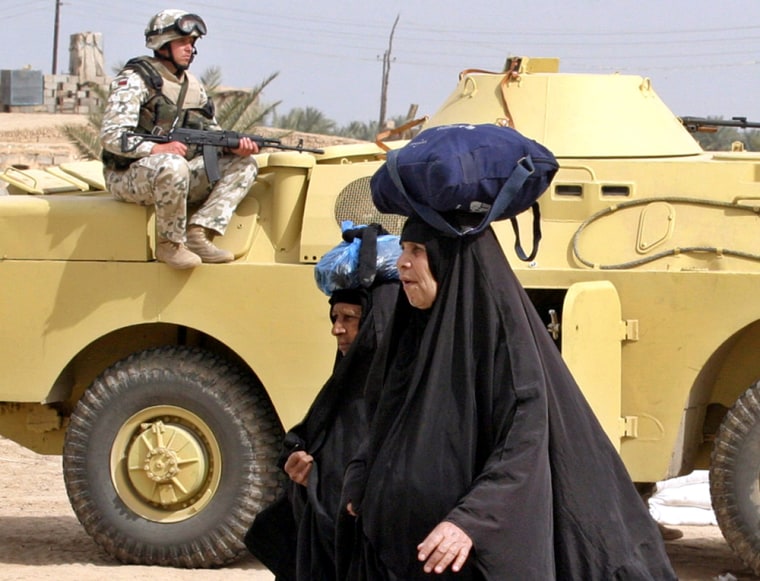Poland caused confusion Wednesday for the U.S.-led coalition in Iraq when it sent mixed signals on whether it would keep its troops in Iraq.
The Dominican Republic followed Spain and Honduras in saying it would be withdrawing troops soon. Ukraine, meanwhile, told the Bush administration that it wants members of the U.S.-led military coalition to have more influence in decisions on nonmilitary issues.
In Warsaw, Prime Minister Leszek Miller told the Polish news agency PAP that “we will not make any rash gestures” about Polish troops in Iraq.
“The final decision about the pullout will be agreed and thought over, but the problem exists,” he said, adding that "we cannot turn a blind eye to the fact that Spain and others are leaving Iraq.”
Miller, who is stepping down May 2, said his government was discussing the issue with Washington and that the problem would be addressed by his successor.
A government spokesman later said Poland was not considering a troop pullout.
“Poland will be in Iraq as long as it necessary, until the situation there is stabilized,” spokesman Marcin Kaszuba told The Associated Press. “Poland has not and is not considering a troop withdrawal.”
Kaszuba said Miller only meant to restate the government’s position “that the government is not considering increasing its contingent” in Iraq.
Poland leads a multinational contingent of 9,500 troops in central Iraq, and is the largest contributor to the force with 2,400 soldiers of its own. Some 1,300 Spanish troops that the Madrid government has said it will withdraw are also in the sector.
Ukraine's position
On Tuesday, Ukraine's foreign minister, Kostyantyn Gryshchenko, expressed his concerns in a phone call with U.S. Secretary of State Colin Powell.
In the call, initiated by Powell, Gryshchenko “stressed the importance of stepping up political contacts between coalition countries on key questions involving the present and future of Iraq,” Ukraine's foreign ministry said.
The two discussed opportunities for Ukraine to take part in reconstruction projects.
Ukraine has about 1,650 soldiers in Iraq — the fourth largest contribution behind Britain, Italy and Poland.
Ukraine opposed the U.S.-led war, but its troop contribution improved relations that were frayed by suspicions that President Leonid Kuchma approved sales of anti-aircraft radar systems to Saddam Hussein.
Some Ukrainian lawmakers have demanded that Kuchma withdraw the country’s troops, but the government has resisted.
In other developments:
- The Dominican Republic said Tuesday it would withdraw its 302 troops in the coming weeks. President Hipolito Mejia had pledged to keep the troops there until August, but Mejia changed his mind because of security concerns.
- Australia will not send more troops to help fill the void, Prime Minister John Howard said on Wednesday. “We haven’t been asked and we’re not planning to,” Howard told Australian radio. Australia, a staunch U.S. ally, was an original member of the U.S.-led coalition, but only around 350 of its 2,000 troops are left in Iraq.
- Italian Premier Silvio Berlusconi said Italian troops should remain in Iraq after the June 30 transfer of sovereignty to a new Iraqi government. He has previously indicated that Italian troops might remain, particularly if there is ever a U.N. resolution for a multilateral force, as the United States has proposed. “I believe it is necessary to remain,” the premier was quoted as saying. “I believe it has to do with responsibility.”
- Thailand’s Senate voted 68-50 on Tuesday to keep the country’s 443 non-combat troops in Iraq. Prime Minister Thaksin Shinawatra said the safety of the Thai soldiers there has not been compromised.
Spain, Honduras pulling out
In Washington Monday, President Bush voiced disappointment with the troop withdrawal decision by Spain’s new prime minister, urging him to avoid actions that give “false comfort to terrorists or enemies of freedom in Iraq.”
No country stepped forward immediately to take the place of Spain, which ranked sixth in contributing troops, and by late Monday Honduras said it would withdraw its 370 troops from Iraq “in the shortest possible time.”
Soldiers from Honduras, a strong U.S. ally in Central America, have been clearing mines and providing medical care in central Iraq since last summer. They had previously been set to leave when their mandate expires in July.
“Honduras was affected by the decision of Spain,” State Department spokesman Richard Boucher said earlier. El Salvador and Nicaragua, the two other Central American countries with peacekeeping troops in Iraq, are holding fast, he said.
Bush expressed unhappiness about Spain’s projected withdrawal in a five-minute telephone call with Prime Minister Jose Luis Rodriguez Zapatero, who on Sunday ordered the 1,300 troops to return home as soon as possible.
